A Study on Depression Among Women in the UK and Support Services
VerifiedAdded on 2022/08/16
|10
|2427
|15
Report
AI Summary
This report examines the prevalence of depression among women in the UK, highlighting the support services available to them. It begins by establishing the background of the study, noting the higher rates of depression among women compared to men and exploring factors such as societal deprivation, gender inequality, and biological reasons. The report also discusses the existing online and professional support services offered by the UK government and the NHS, while acknowledging the underutilization of these services due to stigma and lack of awareness. The methodology section details the use of Google Scholar for gathering primary research articles, employing inclusion and exclusion criteria to select relevant studies. The report further presents a compilation of primary research studies focusing on various aspects of depression in women, including the effects of interventions like Pilates and estradiol administration, experiences of pregnant women in group exercise, disclosure of depression in primary care, trajectories of antenatal depression, and the prevalence of depression in menopausal women. Ultimately, the research aims to raise awareness and improve support services for women in the UK facing depression and other mental health issues.
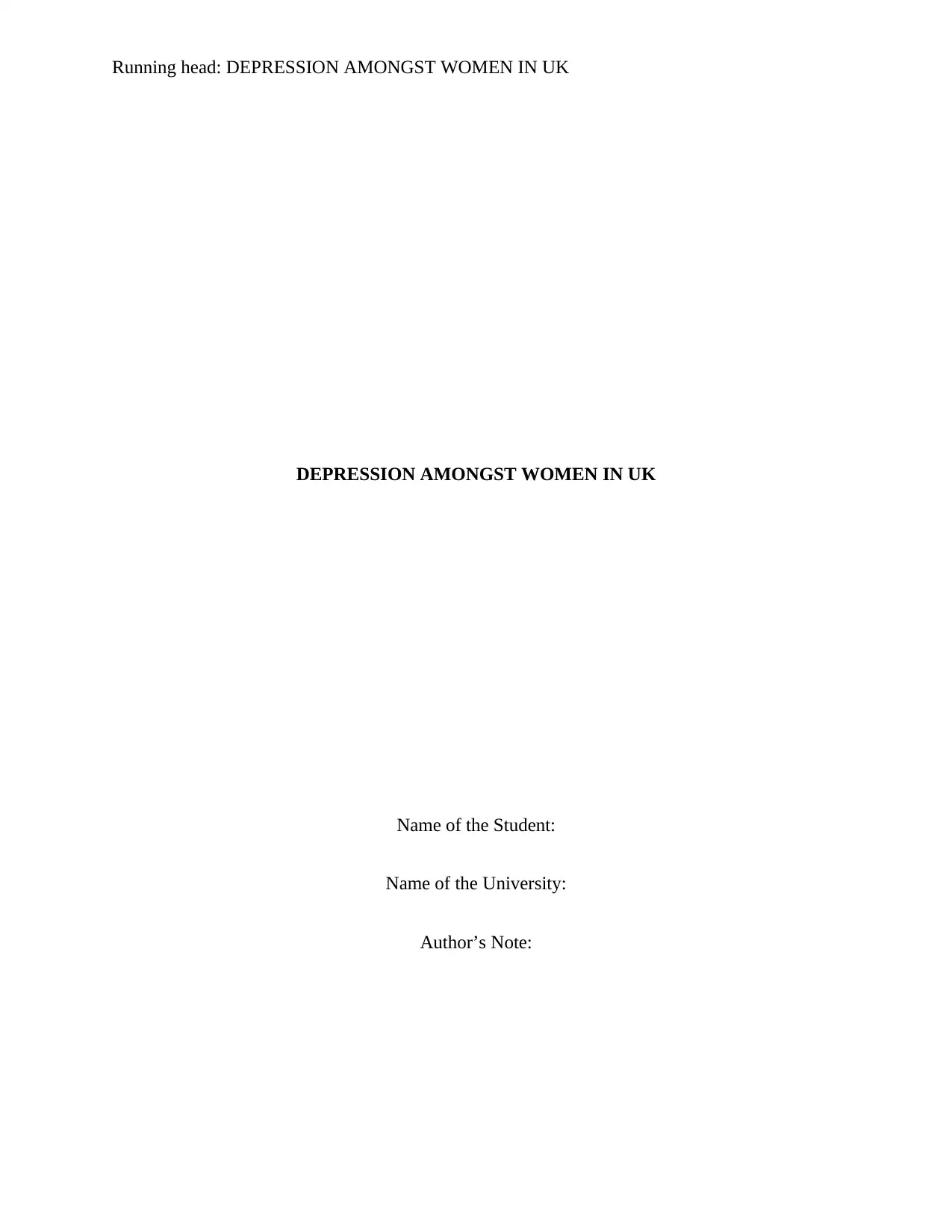
Running head: DEPRESSION AMONGST WOMEN IN UK
DEPRESSION AMONGST WOMEN IN UK
Name of the Student:
Name of the University:
Author’s Note:
DEPRESSION AMONGST WOMEN IN UK
Name of the Student:
Name of the University:
Author’s Note:
Paraphrase This Document
Need a fresh take? Get an instant paraphrase of this document with our AI Paraphraser
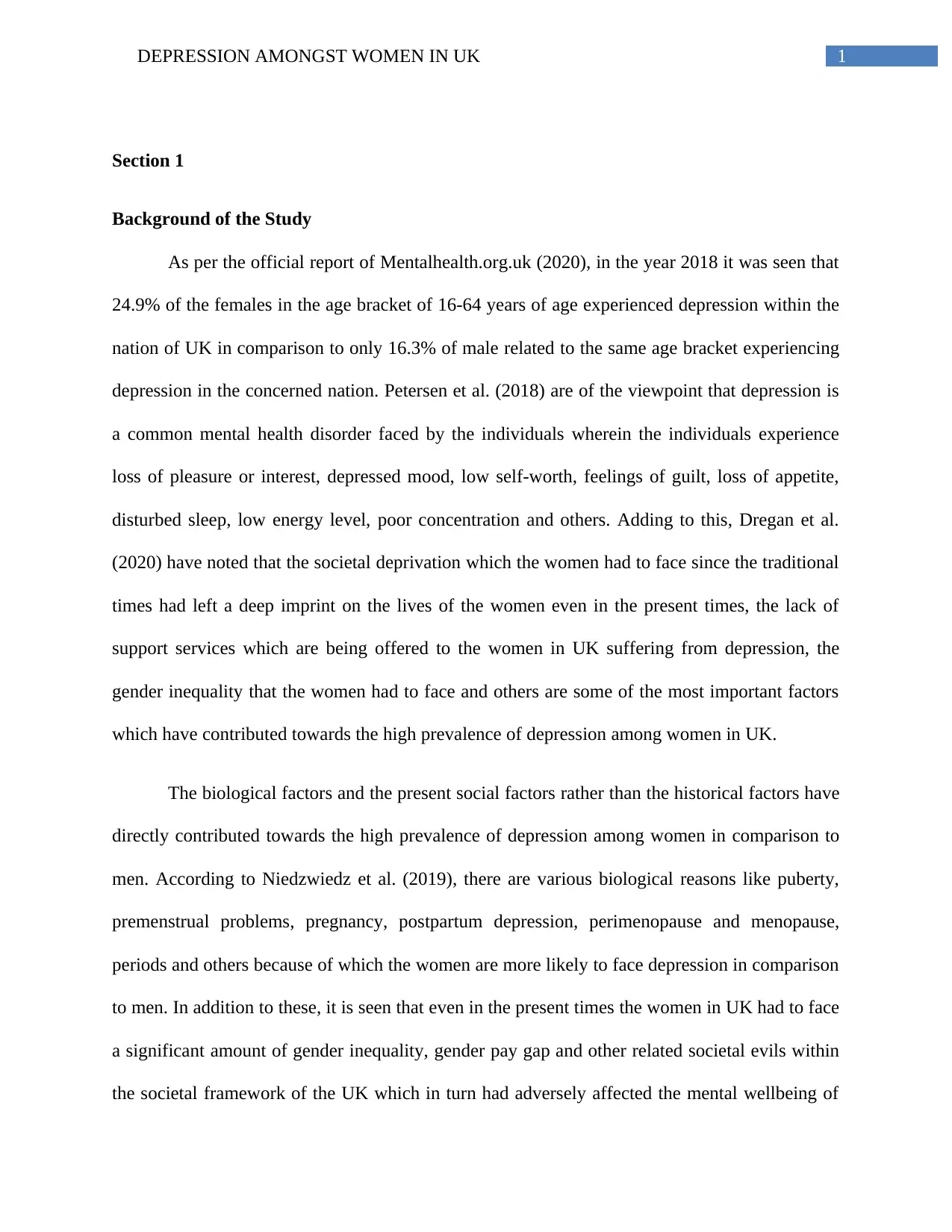
1DEPRESSION AMONGST WOMEN IN UK
Section 1
Background of the Study
As per the official report of Mentalhealth.org.uk (2020), in the year 2018 it was seen that
24.9% of the females in the age bracket of 16-64 years of age experienced depression within the
nation of UK in comparison to only 16.3% of male related to the same age bracket experiencing
depression in the concerned nation. Petersen et al. (2018) are of the viewpoint that depression is
a common mental health disorder faced by the individuals wherein the individuals experience
loss of pleasure or interest, depressed mood, low self-worth, feelings of guilt, loss of appetite,
disturbed sleep, low energy level, poor concentration and others. Adding to this, Dregan et al.
(2020) have noted that the societal deprivation which the women had to face since the traditional
times had left a deep imprint on the lives of the women even in the present times, the lack of
support services which are being offered to the women in UK suffering from depression, the
gender inequality that the women had to face and others are some of the most important factors
which have contributed towards the high prevalence of depression among women in UK.
The biological factors and the present social factors rather than the historical factors have
directly contributed towards the high prevalence of depression among women in comparison to
men. According to Niedzwiedz et al. (2019), there are various biological reasons like puberty,
premenstrual problems, pregnancy, postpartum depression, perimenopause and menopause,
periods and others because of which the women are more likely to face depression in comparison
to men. In addition to these, it is seen that even in the present times the women in UK had to face
a significant amount of gender inequality, gender pay gap and other related societal evils within
the societal framework of the UK which in turn had adversely affected the mental wellbeing of
Section 1
Background of the Study
As per the official report of Mentalhealth.org.uk (2020), in the year 2018 it was seen that
24.9% of the females in the age bracket of 16-64 years of age experienced depression within the
nation of UK in comparison to only 16.3% of male related to the same age bracket experiencing
depression in the concerned nation. Petersen et al. (2018) are of the viewpoint that depression is
a common mental health disorder faced by the individuals wherein the individuals experience
loss of pleasure or interest, depressed mood, low self-worth, feelings of guilt, loss of appetite,
disturbed sleep, low energy level, poor concentration and others. Adding to this, Dregan et al.
(2020) have noted that the societal deprivation which the women had to face since the traditional
times had left a deep imprint on the lives of the women even in the present times, the lack of
support services which are being offered to the women in UK suffering from depression, the
gender inequality that the women had to face and others are some of the most important factors
which have contributed towards the high prevalence of depression among women in UK.
The biological factors and the present social factors rather than the historical factors have
directly contributed towards the high prevalence of depression among women in comparison to
men. According to Niedzwiedz et al. (2019), there are various biological reasons like puberty,
premenstrual problems, pregnancy, postpartum depression, perimenopause and menopause,
periods and others because of which the women are more likely to face depression in comparison
to men. In addition to these, it is seen that even in the present times the women in UK had to face
a significant amount of gender inequality, gender pay gap and other related societal evils within
the societal framework of the UK which in turn had adversely affected the mental wellbeing of
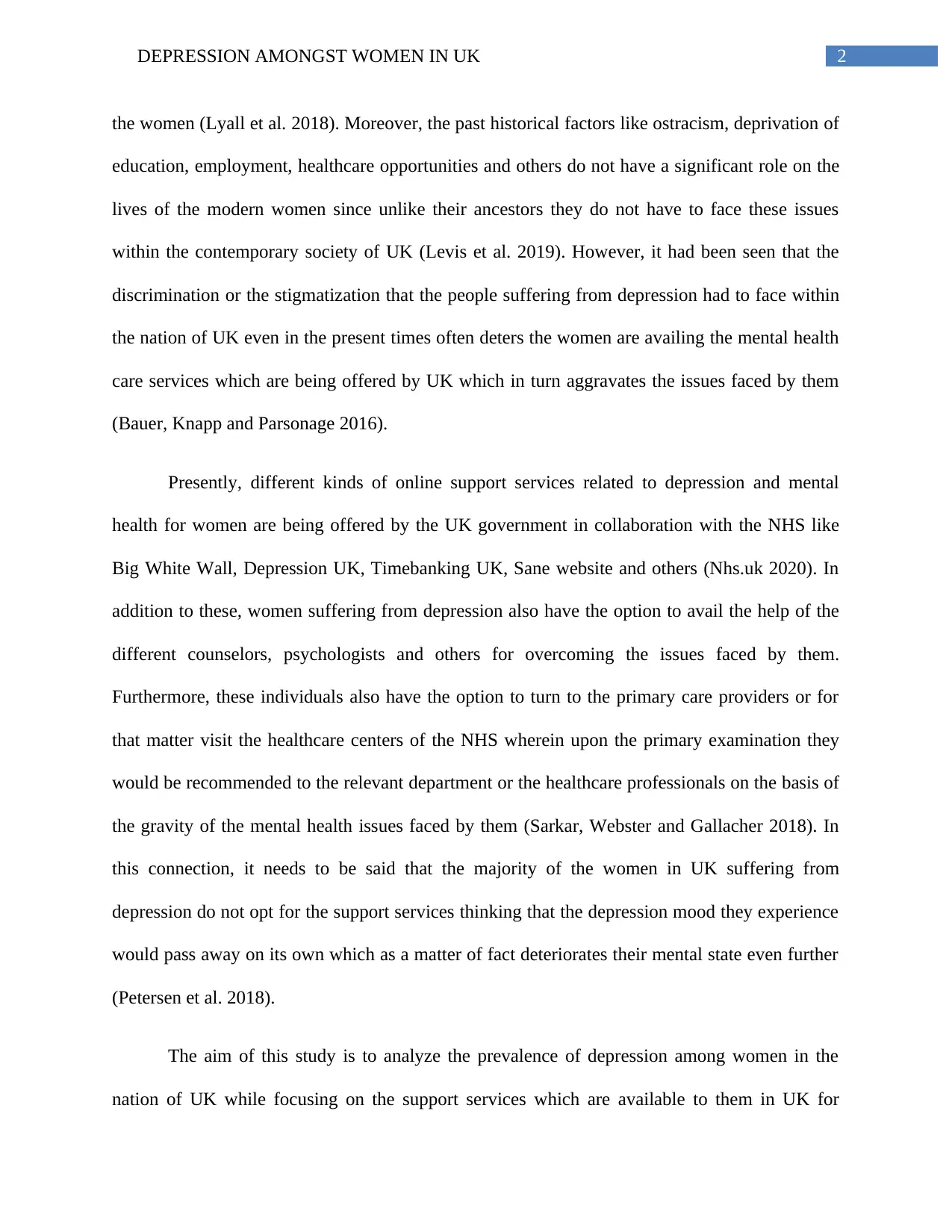
2DEPRESSION AMONGST WOMEN IN UK
the women (Lyall et al. 2018). Moreover, the past historical factors like ostracism, deprivation of
education, employment, healthcare opportunities and others do not have a significant role on the
lives of the modern women since unlike their ancestors they do not have to face these issues
within the contemporary society of UK (Levis et al. 2019). However, it had been seen that the
discrimination or the stigmatization that the people suffering from depression had to face within
the nation of UK even in the present times often deters the women are availing the mental health
care services which are being offered by UK which in turn aggravates the issues faced by them
(Bauer, Knapp and Parsonage 2016).
Presently, different kinds of online support services related to depression and mental
health for women are being offered by the UK government in collaboration with the NHS like
Big White Wall, Depression UK, Timebanking UK, Sane website and others (Nhs.uk 2020). In
addition to these, women suffering from depression also have the option to avail the help of the
different counselors, psychologists and others for overcoming the issues faced by them.
Furthermore, these individuals also have the option to turn to the primary care providers or for
that matter visit the healthcare centers of the NHS wherein upon the primary examination they
would be recommended to the relevant department or the healthcare professionals on the basis of
the gravity of the mental health issues faced by them (Sarkar, Webster and Gallacher 2018). In
this connection, it needs to be said that the majority of the women in UK suffering from
depression do not opt for the support services thinking that the depression mood they experience
would pass away on its own which as a matter of fact deteriorates their mental state even further
(Petersen et al. 2018).
The aim of this study is to analyze the prevalence of depression among women in the
nation of UK while focusing on the support services which are available to them in UK for
the women (Lyall et al. 2018). Moreover, the past historical factors like ostracism, deprivation of
education, employment, healthcare opportunities and others do not have a significant role on the
lives of the modern women since unlike their ancestors they do not have to face these issues
within the contemporary society of UK (Levis et al. 2019). However, it had been seen that the
discrimination or the stigmatization that the people suffering from depression had to face within
the nation of UK even in the present times often deters the women are availing the mental health
care services which are being offered by UK which in turn aggravates the issues faced by them
(Bauer, Knapp and Parsonage 2016).
Presently, different kinds of online support services related to depression and mental
health for women are being offered by the UK government in collaboration with the NHS like
Big White Wall, Depression UK, Timebanking UK, Sane website and others (Nhs.uk 2020). In
addition to these, women suffering from depression also have the option to avail the help of the
different counselors, psychologists and others for overcoming the issues faced by them.
Furthermore, these individuals also have the option to turn to the primary care providers or for
that matter visit the healthcare centers of the NHS wherein upon the primary examination they
would be recommended to the relevant department or the healthcare professionals on the basis of
the gravity of the mental health issues faced by them (Sarkar, Webster and Gallacher 2018). In
this connection, it needs to be said that the majority of the women in UK suffering from
depression do not opt for the support services thinking that the depression mood they experience
would pass away on its own which as a matter of fact deteriorates their mental state even further
(Petersen et al. 2018).
The aim of this study is to analyze the prevalence of depression among women in the
nation of UK while focusing on the support services which are available to them in UK for
⊘ This is a preview!⊘
Do you want full access?
Subscribe today to unlock all pages.

Trusted by 1+ million students worldwide
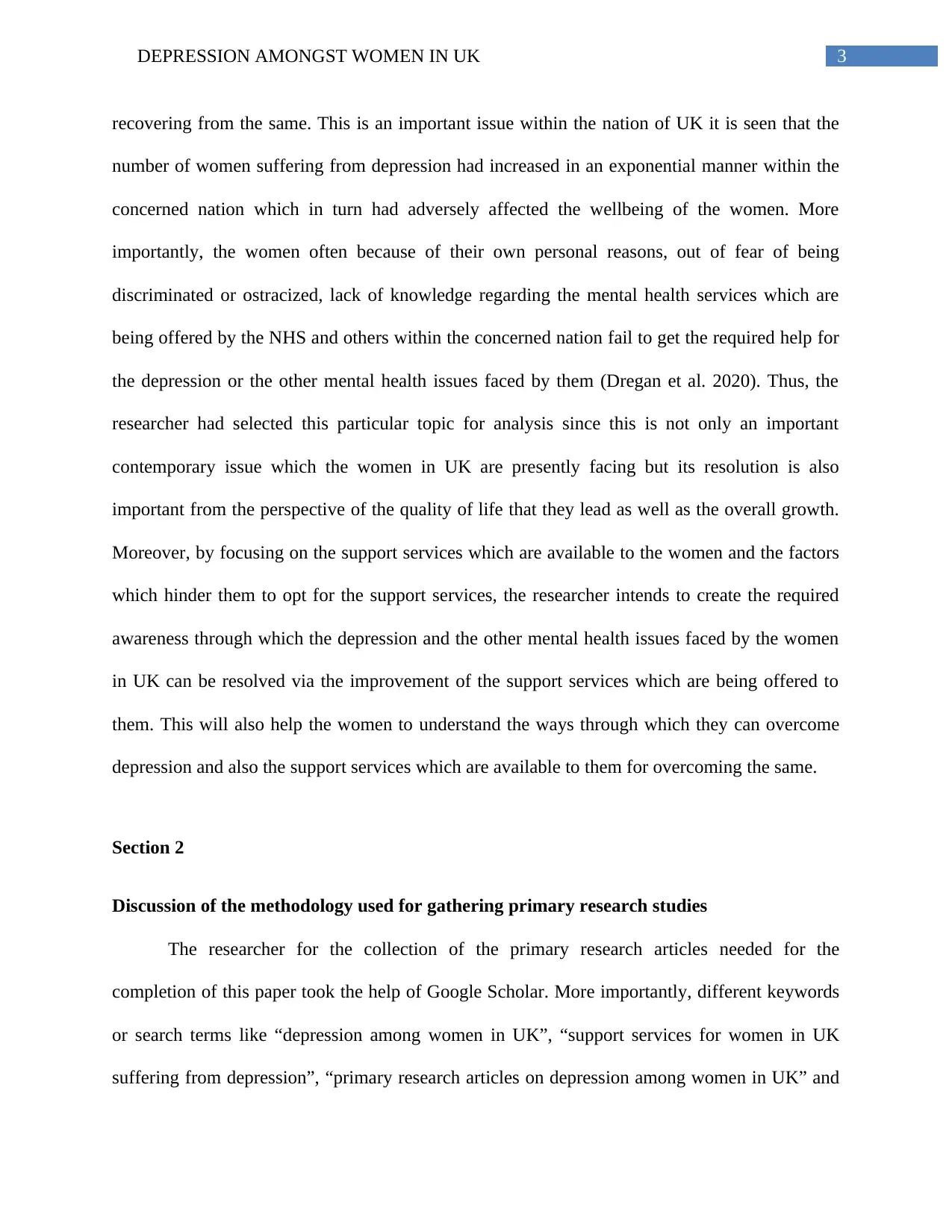
3DEPRESSION AMONGST WOMEN IN UK
recovering from the same. This is an important issue within the nation of UK it is seen that the
number of women suffering from depression had increased in an exponential manner within the
concerned nation which in turn had adversely affected the wellbeing of the women. More
importantly, the women often because of their own personal reasons, out of fear of being
discriminated or ostracized, lack of knowledge regarding the mental health services which are
being offered by the NHS and others within the concerned nation fail to get the required help for
the depression or the other mental health issues faced by them (Dregan et al. 2020). Thus, the
researcher had selected this particular topic for analysis since this is not only an important
contemporary issue which the women in UK are presently facing but its resolution is also
important from the perspective of the quality of life that they lead as well as the overall growth.
Moreover, by focusing on the support services which are available to the women and the factors
which hinder them to opt for the support services, the researcher intends to create the required
awareness through which the depression and the other mental health issues faced by the women
in UK can be resolved via the improvement of the support services which are being offered to
them. This will also help the women to understand the ways through which they can overcome
depression and also the support services which are available to them for overcoming the same.
Section 2
Discussion of the methodology used for gathering primary research studies
The researcher for the collection of the primary research articles needed for the
completion of this paper took the help of Google Scholar. More importantly, different keywords
or search terms like “depression among women in UK”, “support services for women in UK
suffering from depression”, “primary research articles on depression among women in UK” and
recovering from the same. This is an important issue within the nation of UK it is seen that the
number of women suffering from depression had increased in an exponential manner within the
concerned nation which in turn had adversely affected the wellbeing of the women. More
importantly, the women often because of their own personal reasons, out of fear of being
discriminated or ostracized, lack of knowledge regarding the mental health services which are
being offered by the NHS and others within the concerned nation fail to get the required help for
the depression or the other mental health issues faced by them (Dregan et al. 2020). Thus, the
researcher had selected this particular topic for analysis since this is not only an important
contemporary issue which the women in UK are presently facing but its resolution is also
important from the perspective of the quality of life that they lead as well as the overall growth.
Moreover, by focusing on the support services which are available to the women and the factors
which hinder them to opt for the support services, the researcher intends to create the required
awareness through which the depression and the other mental health issues faced by the women
in UK can be resolved via the improvement of the support services which are being offered to
them. This will also help the women to understand the ways through which they can overcome
depression and also the support services which are available to them for overcoming the same.
Section 2
Discussion of the methodology used for gathering primary research studies
The researcher for the collection of the primary research articles needed for the
completion of this paper took the help of Google Scholar. More importantly, different keywords
or search terms like “depression among women in UK”, “support services for women in UK
suffering from depression”, “primary research articles on depression among women in UK” and
Paraphrase This Document
Need a fresh take? Get an instant paraphrase of this document with our AI Paraphraser
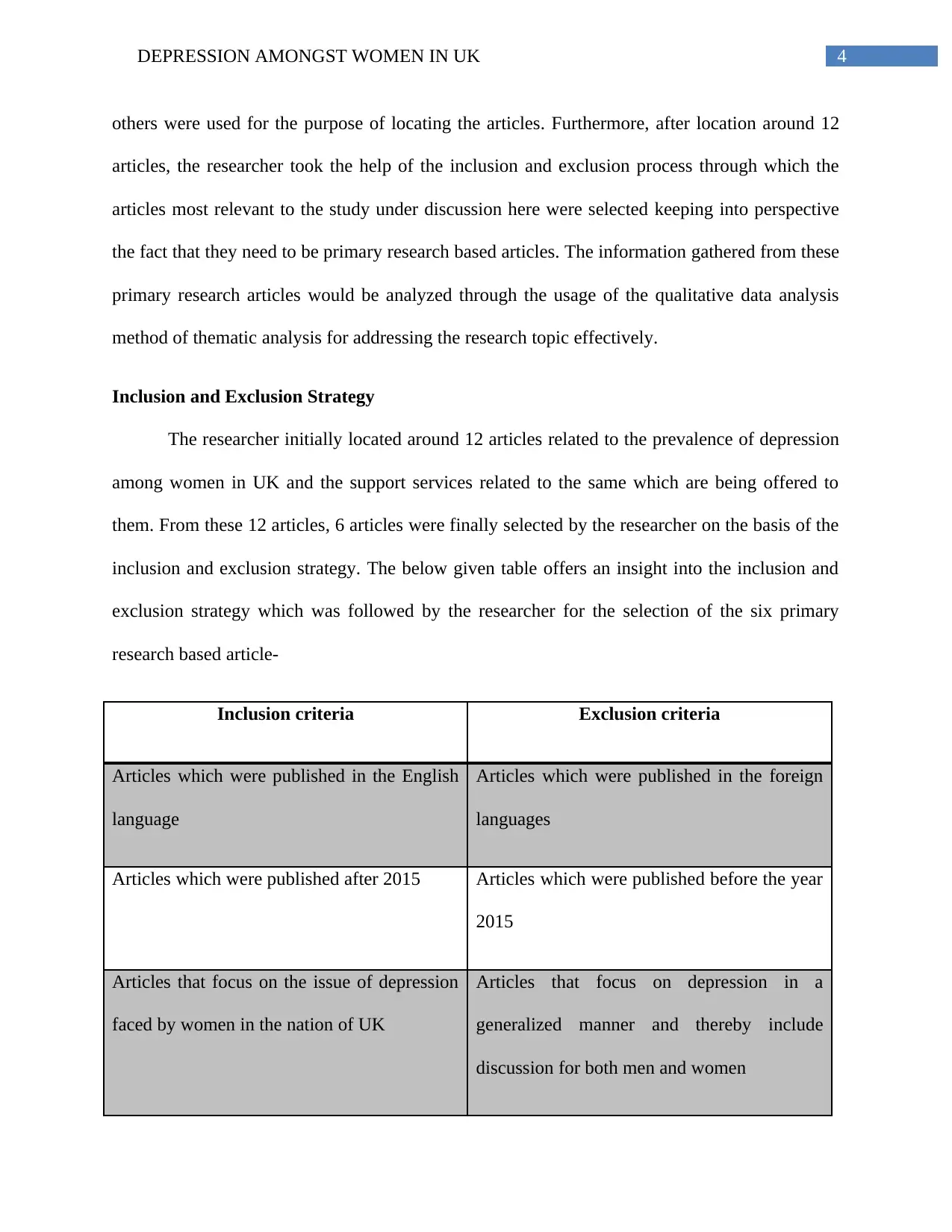
4DEPRESSION AMONGST WOMEN IN UK
others were used for the purpose of locating the articles. Furthermore, after location around 12
articles, the researcher took the help of the inclusion and exclusion process through which the
articles most relevant to the study under discussion here were selected keeping into perspective
the fact that they need to be primary research based articles. The information gathered from these
primary research articles would be analyzed through the usage of the qualitative data analysis
method of thematic analysis for addressing the research topic effectively.
Inclusion and Exclusion Strategy
The researcher initially located around 12 articles related to the prevalence of depression
among women in UK and the support services related to the same which are being offered to
them. From these 12 articles, 6 articles were finally selected by the researcher on the basis of the
inclusion and exclusion strategy. The below given table offers an insight into the inclusion and
exclusion strategy which was followed by the researcher for the selection of the six primary
research based article-
Inclusion criteria Exclusion criteria
Articles which were published in the English
language
Articles which were published in the foreign
languages
Articles which were published after 2015 Articles which were published before the year
2015
Articles that focus on the issue of depression
faced by women in the nation of UK
Articles that focus on depression in a
generalized manner and thereby include
discussion for both men and women
others were used for the purpose of locating the articles. Furthermore, after location around 12
articles, the researcher took the help of the inclusion and exclusion process through which the
articles most relevant to the study under discussion here were selected keeping into perspective
the fact that they need to be primary research based articles. The information gathered from these
primary research articles would be analyzed through the usage of the qualitative data analysis
method of thematic analysis for addressing the research topic effectively.
Inclusion and Exclusion Strategy
The researcher initially located around 12 articles related to the prevalence of depression
among women in UK and the support services related to the same which are being offered to
them. From these 12 articles, 6 articles were finally selected by the researcher on the basis of the
inclusion and exclusion strategy. The below given table offers an insight into the inclusion and
exclusion strategy which was followed by the researcher for the selection of the six primary
research based article-
Inclusion criteria Exclusion criteria
Articles which were published in the English
language
Articles which were published in the foreign
languages
Articles which were published after 2015 Articles which were published before the year
2015
Articles that focus on the issue of depression
faced by women in the nation of UK
Articles that focus on depression in a
generalized manner and thereby include
discussion for both men and women
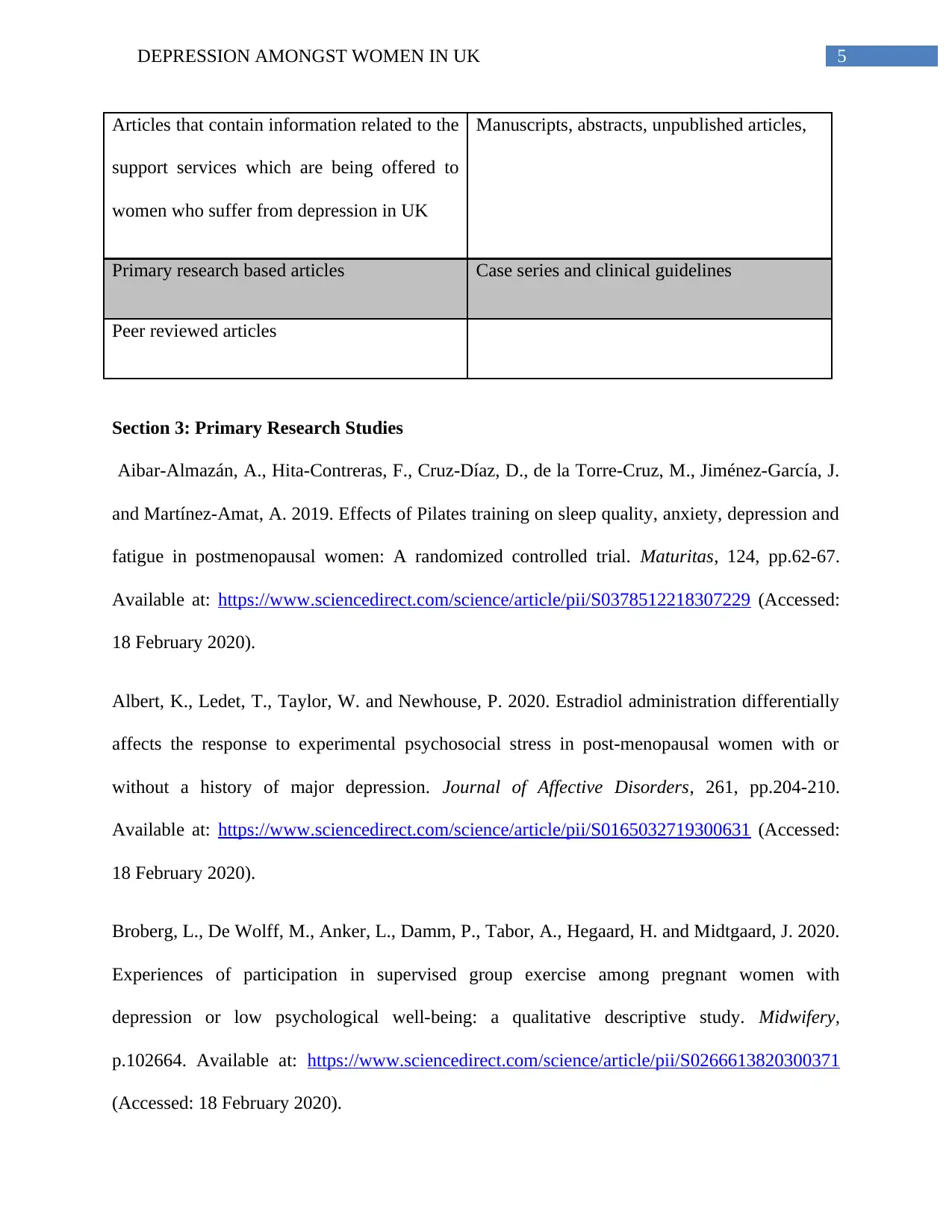
5DEPRESSION AMONGST WOMEN IN UK
Articles that contain information related to the
support services which are being offered to
women who suffer from depression in UK
Manuscripts, abstracts, unpublished articles,
Primary research based articles Case series and clinical guidelines
Peer reviewed articles
Section 3: Primary Research Studies
Aibar-Almazán, A., Hita-Contreras, F., Cruz-Díaz, D., de la Torre-Cruz, M., Jiménez-García, J.
and Martínez-Amat, A. 2019. Effects of Pilates training on sleep quality, anxiety, depression and
fatigue in postmenopausal women: A randomized controlled trial. Maturitas, 124, pp.62-67.
Available at: https://www.sciencedirect.com/science/article/pii/S0378512218307229 (Accessed:
18 February 2020).
Albert, K., Ledet, T., Taylor, W. and Newhouse, P. 2020. Estradiol administration differentially
affects the response to experimental psychosocial stress in post-menopausal women with or
without a history of major depression. Journal of Affective Disorders, 261, pp.204-210.
Available at: https://www.sciencedirect.com/science/article/pii/S0165032719300631 (Accessed:
18 February 2020).
Broberg, L., De Wolff, M., Anker, L., Damm, P., Tabor, A., Hegaard, H. and Midtgaard, J. 2020.
Experiences of participation in supervised group exercise among pregnant women with
depression or low psychological well-being: a qualitative descriptive study. Midwifery,
p.102664. Available at: https://www.sciencedirect.com/science/article/pii/S0266613820300371
(Accessed: 18 February 2020).
Articles that contain information related to the
support services which are being offered to
women who suffer from depression in UK
Manuscripts, abstracts, unpublished articles,
Primary research based articles Case series and clinical guidelines
Peer reviewed articles
Section 3: Primary Research Studies
Aibar-Almazán, A., Hita-Contreras, F., Cruz-Díaz, D., de la Torre-Cruz, M., Jiménez-García, J.
and Martínez-Amat, A. 2019. Effects of Pilates training on sleep quality, anxiety, depression and
fatigue in postmenopausal women: A randomized controlled trial. Maturitas, 124, pp.62-67.
Available at: https://www.sciencedirect.com/science/article/pii/S0378512218307229 (Accessed:
18 February 2020).
Albert, K., Ledet, T., Taylor, W. and Newhouse, P. 2020. Estradiol administration differentially
affects the response to experimental psychosocial stress in post-menopausal women with or
without a history of major depression. Journal of Affective Disorders, 261, pp.204-210.
Available at: https://www.sciencedirect.com/science/article/pii/S0165032719300631 (Accessed:
18 February 2020).
Broberg, L., De Wolff, M., Anker, L., Damm, P., Tabor, A., Hegaard, H. and Midtgaard, J. 2020.
Experiences of participation in supervised group exercise among pregnant women with
depression or low psychological well-being: a qualitative descriptive study. Midwifery,
p.102664. Available at: https://www.sciencedirect.com/science/article/pii/S0266613820300371
(Accessed: 18 February 2020).
⊘ This is a preview!⊘
Do you want full access?
Subscribe today to unlock all pages.

Trusted by 1+ million students worldwide
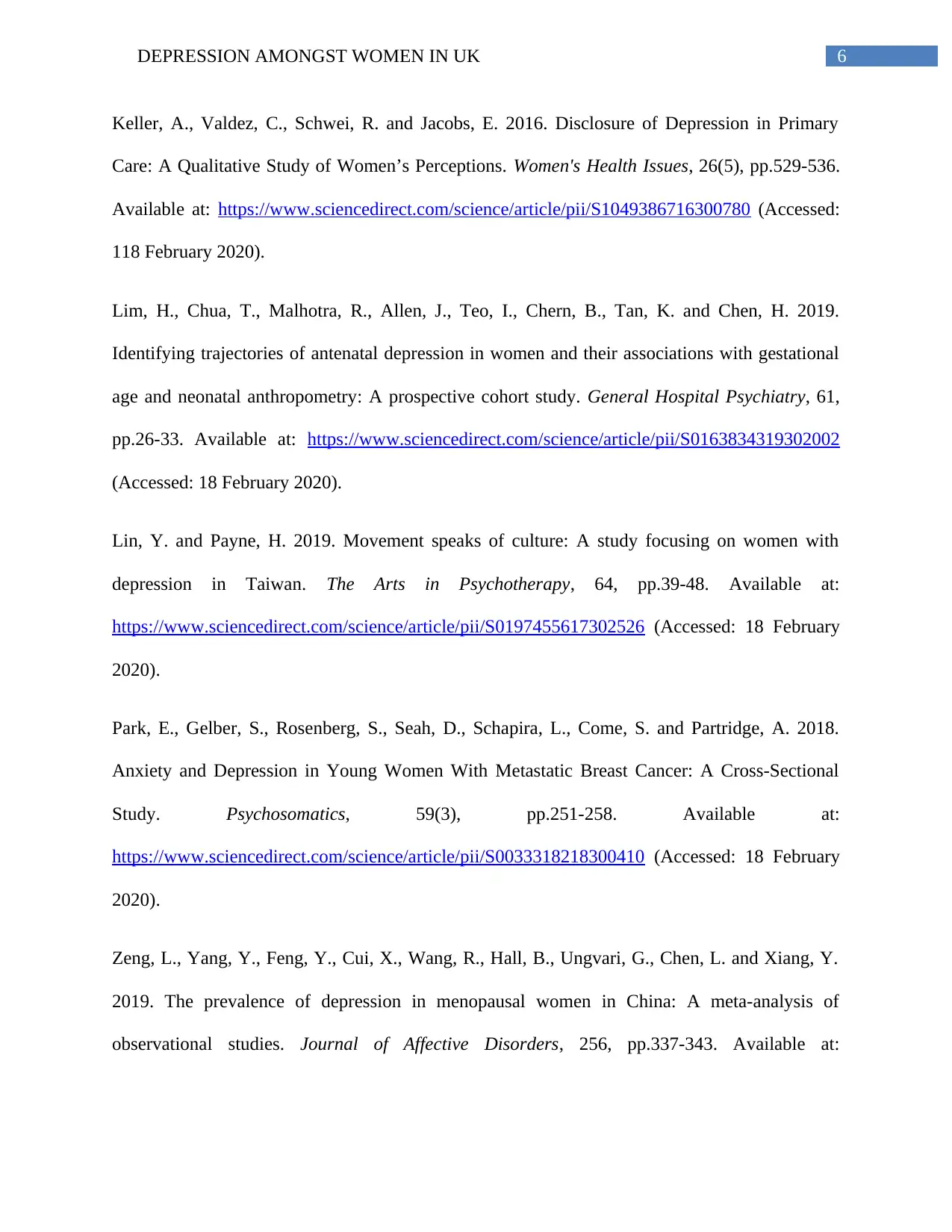
6DEPRESSION AMONGST WOMEN IN UK
Keller, A., Valdez, C., Schwei, R. and Jacobs, E. 2016. Disclosure of Depression in Primary
Care: A Qualitative Study of Women’s Perceptions. Women's Health Issues, 26(5), pp.529-536.
Available at: https://www.sciencedirect.com/science/article/pii/S1049386716300780 (Accessed:
118 February 2020).
Lim, H., Chua, T., Malhotra, R., Allen, J., Teo, I., Chern, B., Tan, K. and Chen, H. 2019.
Identifying trajectories of antenatal depression in women and their associations with gestational
age and neonatal anthropometry: A prospective cohort study. General Hospital Psychiatry, 61,
pp.26-33. Available at: https://www.sciencedirect.com/science/article/pii/S0163834319302002
(Accessed: 18 February 2020).
Lin, Y. and Payne, H. 2019. Movement speaks of culture: A study focusing on women with
depression in Taiwan. The Arts in Psychotherapy, 64, pp.39-48. Available at:
https://www.sciencedirect.com/science/article/pii/S0197455617302526 (Accessed: 18 February
2020).
Park, E., Gelber, S., Rosenberg, S., Seah, D., Schapira, L., Come, S. and Partridge, A. 2018.
Anxiety and Depression in Young Women With Metastatic Breast Cancer: A Cross-Sectional
Study. Psychosomatics, 59(3), pp.251-258. Available at:
https://www.sciencedirect.com/science/article/pii/S0033318218300410 (Accessed: 18 February
2020).
Zeng, L., Yang, Y., Feng, Y., Cui, X., Wang, R., Hall, B., Ungvari, G., Chen, L. and Xiang, Y.
2019. The prevalence of depression in menopausal women in China: A meta-analysis of
observational studies. Journal of Affective Disorders, 256, pp.337-343. Available at:
Keller, A., Valdez, C., Schwei, R. and Jacobs, E. 2016. Disclosure of Depression in Primary
Care: A Qualitative Study of Women’s Perceptions. Women's Health Issues, 26(5), pp.529-536.
Available at: https://www.sciencedirect.com/science/article/pii/S1049386716300780 (Accessed:
118 February 2020).
Lim, H., Chua, T., Malhotra, R., Allen, J., Teo, I., Chern, B., Tan, K. and Chen, H. 2019.
Identifying trajectories of antenatal depression in women and their associations with gestational
age and neonatal anthropometry: A prospective cohort study. General Hospital Psychiatry, 61,
pp.26-33. Available at: https://www.sciencedirect.com/science/article/pii/S0163834319302002
(Accessed: 18 February 2020).
Lin, Y. and Payne, H. 2019. Movement speaks of culture: A study focusing on women with
depression in Taiwan. The Arts in Psychotherapy, 64, pp.39-48. Available at:
https://www.sciencedirect.com/science/article/pii/S0197455617302526 (Accessed: 18 February
2020).
Park, E., Gelber, S., Rosenberg, S., Seah, D., Schapira, L., Come, S. and Partridge, A. 2018.
Anxiety and Depression in Young Women With Metastatic Breast Cancer: A Cross-Sectional
Study. Psychosomatics, 59(3), pp.251-258. Available at:
https://www.sciencedirect.com/science/article/pii/S0033318218300410 (Accessed: 18 February
2020).
Zeng, L., Yang, Y., Feng, Y., Cui, X., Wang, R., Hall, B., Ungvari, G., Chen, L. and Xiang, Y.
2019. The prevalence of depression in menopausal women in China: A meta-analysis of
observational studies. Journal of Affective Disorders, 256, pp.337-343. Available at:
Paraphrase This Document
Need a fresh take? Get an instant paraphrase of this document with our AI Paraphraser

7DEPRESSION AMONGST WOMEN IN UK
https://www.sciencedirect.com/science/article/pii/S0165032719304793 (Accessed: 18 February
2020).
https://www.sciencedirect.com/science/article/pii/S0165032719304793 (Accessed: 18 February
2020).
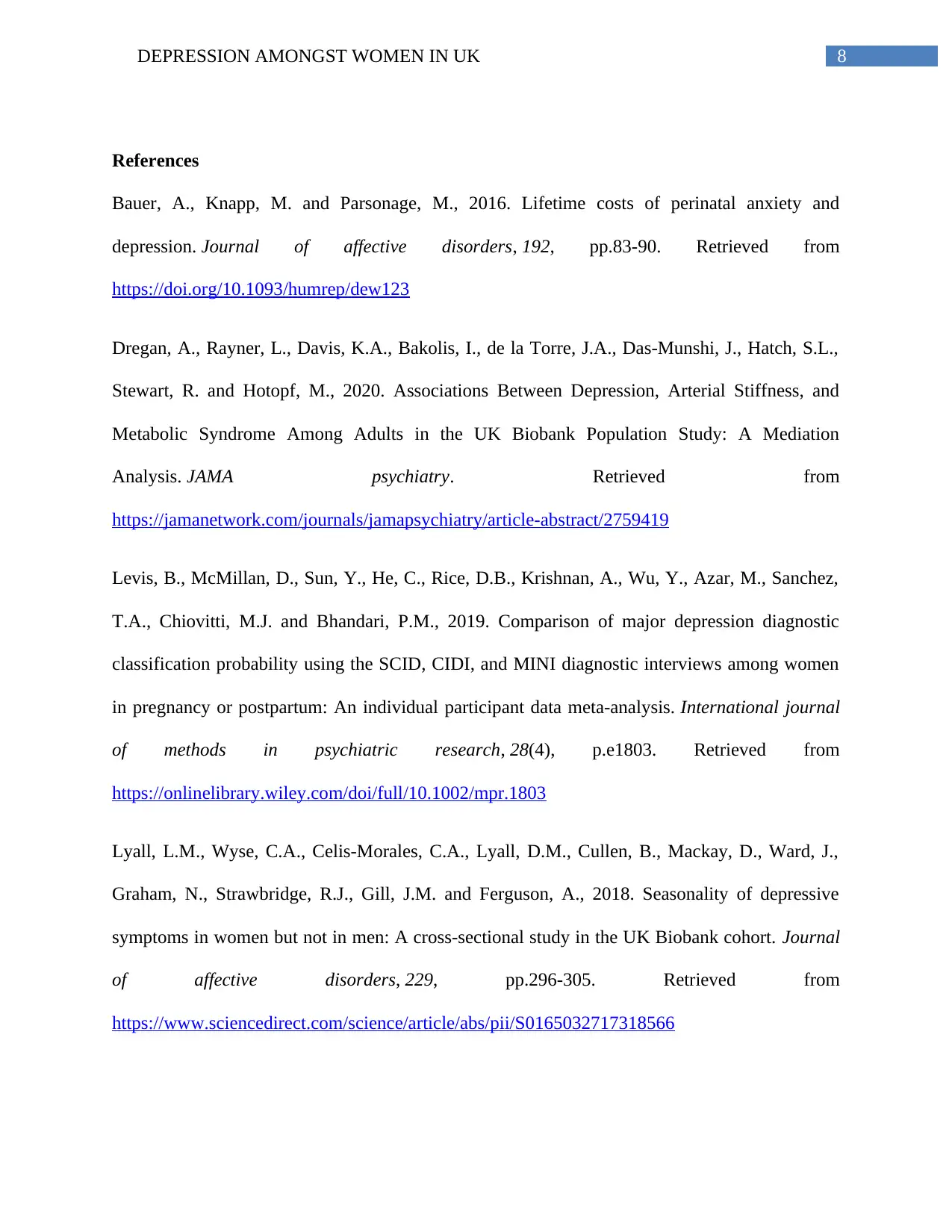
8DEPRESSION AMONGST WOMEN IN UK
References
Bauer, A., Knapp, M. and Parsonage, M., 2016. Lifetime costs of perinatal anxiety and
depression. Journal of affective disorders, 192, pp.83-90. Retrieved from
https://doi.org/10.1093/humrep/dew123
Dregan, A., Rayner, L., Davis, K.A., Bakolis, I., de la Torre, J.A., Das-Munshi, J., Hatch, S.L.,
Stewart, R. and Hotopf, M., 2020. Associations Between Depression, Arterial Stiffness, and
Metabolic Syndrome Among Adults in the UK Biobank Population Study: A Mediation
Analysis. JAMA psychiatry. Retrieved from
https://jamanetwork.com/journals/jamapsychiatry/article-abstract/2759419
Levis, B., McMillan, D., Sun, Y., He, C., Rice, D.B., Krishnan, A., Wu, Y., Azar, M., Sanchez,
T.A., Chiovitti, M.J. and Bhandari, P.M., 2019. Comparison of major depression diagnostic
classification probability using the SCID, CIDI, and MINI diagnostic interviews among women
in pregnancy or postpartum: An individual participant data meta‐analysis. International journal
of methods in psychiatric research, 28(4), p.e1803. Retrieved from
https://onlinelibrary.wiley.com/doi/full/10.1002/mpr.1803
Lyall, L.M., Wyse, C.A., Celis-Morales, C.A., Lyall, D.M., Cullen, B., Mackay, D., Ward, J.,
Graham, N., Strawbridge, R.J., Gill, J.M. and Ferguson, A., 2018. Seasonality of depressive
symptoms in women but not in men: A cross-sectional study in the UK Biobank cohort. Journal
of affective disorders, 229, pp.296-305. Retrieved from
https://www.sciencedirect.com/science/article/abs/pii/S0165032717318566
References
Bauer, A., Knapp, M. and Parsonage, M., 2016. Lifetime costs of perinatal anxiety and
depression. Journal of affective disorders, 192, pp.83-90. Retrieved from
https://doi.org/10.1093/humrep/dew123
Dregan, A., Rayner, L., Davis, K.A., Bakolis, I., de la Torre, J.A., Das-Munshi, J., Hatch, S.L.,
Stewart, R. and Hotopf, M., 2020. Associations Between Depression, Arterial Stiffness, and
Metabolic Syndrome Among Adults in the UK Biobank Population Study: A Mediation
Analysis. JAMA psychiatry. Retrieved from
https://jamanetwork.com/journals/jamapsychiatry/article-abstract/2759419
Levis, B., McMillan, D., Sun, Y., He, C., Rice, D.B., Krishnan, A., Wu, Y., Azar, M., Sanchez,
T.A., Chiovitti, M.J. and Bhandari, P.M., 2019. Comparison of major depression diagnostic
classification probability using the SCID, CIDI, and MINI diagnostic interviews among women
in pregnancy or postpartum: An individual participant data meta‐analysis. International journal
of methods in psychiatric research, 28(4), p.e1803. Retrieved from
https://onlinelibrary.wiley.com/doi/full/10.1002/mpr.1803
Lyall, L.M., Wyse, C.A., Celis-Morales, C.A., Lyall, D.M., Cullen, B., Mackay, D., Ward, J.,
Graham, N., Strawbridge, R.J., Gill, J.M. and Ferguson, A., 2018. Seasonality of depressive
symptoms in women but not in men: A cross-sectional study in the UK Biobank cohort. Journal
of affective disorders, 229, pp.296-305. Retrieved from
https://www.sciencedirect.com/science/article/abs/pii/S0165032717318566
⊘ This is a preview!⊘
Do you want full access?
Subscribe today to unlock all pages.

Trusted by 1+ million students worldwide
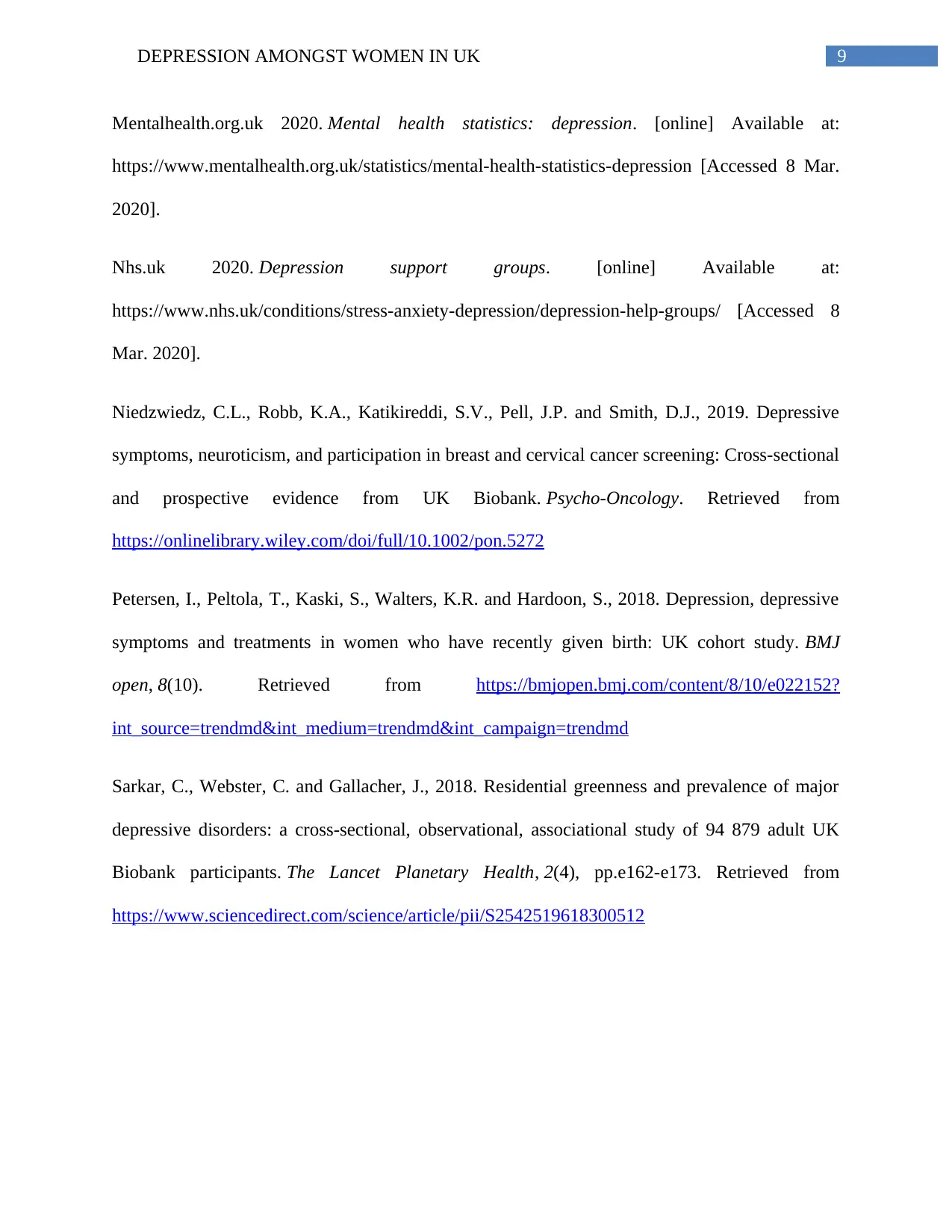
9DEPRESSION AMONGST WOMEN IN UK
Mentalhealth.org.uk 2020. Mental health statistics: depression. [online] Available at:
https://www.mentalhealth.org.uk/statistics/mental-health-statistics-depression [Accessed 8 Mar.
2020].
Nhs.uk 2020. Depression support groups. [online] Available at:
https://www.nhs.uk/conditions/stress-anxiety-depression/depression-help-groups/ [Accessed 8
Mar. 2020].
Niedzwiedz, C.L., Robb, K.A., Katikireddi, S.V., Pell, J.P. and Smith, D.J., 2019. Depressive
symptoms, neuroticism, and participation in breast and cervical cancer screening: Cross‐sectional
and prospective evidence from UK Biobank. Psycho‐Oncology. Retrieved from
https://onlinelibrary.wiley.com/doi/full/10.1002/pon.5272
Petersen, I., Peltola, T., Kaski, S., Walters, K.R. and Hardoon, S., 2018. Depression, depressive
symptoms and treatments in women who have recently given birth: UK cohort study. BMJ
open, 8(10). Retrieved from https://bmjopen.bmj.com/content/8/10/e022152?
int_source=trendmd&int_medium=trendmd&int_campaign=trendmd
Sarkar, C., Webster, C. and Gallacher, J., 2018. Residential greenness and prevalence of major
depressive disorders: a cross-sectional, observational, associational study of 94 879 adult UK
Biobank participants. The Lancet Planetary Health, 2(4), pp.e162-e173. Retrieved from
https://www.sciencedirect.com/science/article/pii/S2542519618300512
Mentalhealth.org.uk 2020. Mental health statistics: depression. [online] Available at:
https://www.mentalhealth.org.uk/statistics/mental-health-statistics-depression [Accessed 8 Mar.
2020].
Nhs.uk 2020. Depression support groups. [online] Available at:
https://www.nhs.uk/conditions/stress-anxiety-depression/depression-help-groups/ [Accessed 8
Mar. 2020].
Niedzwiedz, C.L., Robb, K.A., Katikireddi, S.V., Pell, J.P. and Smith, D.J., 2019. Depressive
symptoms, neuroticism, and participation in breast and cervical cancer screening: Cross‐sectional
and prospective evidence from UK Biobank. Psycho‐Oncology. Retrieved from
https://onlinelibrary.wiley.com/doi/full/10.1002/pon.5272
Petersen, I., Peltola, T., Kaski, S., Walters, K.R. and Hardoon, S., 2018. Depression, depressive
symptoms and treatments in women who have recently given birth: UK cohort study. BMJ
open, 8(10). Retrieved from https://bmjopen.bmj.com/content/8/10/e022152?
int_source=trendmd&int_medium=trendmd&int_campaign=trendmd
Sarkar, C., Webster, C. and Gallacher, J., 2018. Residential greenness and prevalence of major
depressive disorders: a cross-sectional, observational, associational study of 94 879 adult UK
Biobank participants. The Lancet Planetary Health, 2(4), pp.e162-e173. Retrieved from
https://www.sciencedirect.com/science/article/pii/S2542519618300512
1 out of 10
Related Documents
Your All-in-One AI-Powered Toolkit for Academic Success.
+13062052269
info@desklib.com
Available 24*7 on WhatsApp / Email
![[object Object]](/_next/static/media/star-bottom.7253800d.svg)
Unlock your academic potential
Copyright © 2020–2026 A2Z Services. All Rights Reserved. Developed and managed by ZUCOL.





